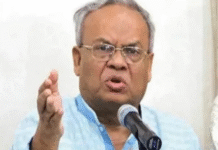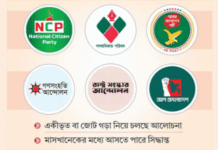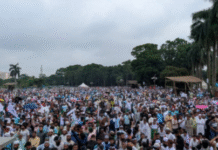A prosecution witness, also the wife of a surgeon martyred in 1971, on Sunday told the International Crimes Tribunal-1 that she had no idea whether her husband was associated with any political party or student organisation.
“Even I had no knowledge about the student politics in 1970,” said PW-23 Syeda Salma Huq, while facing cross-examination of the defence counsel for war crimes accused Jamaat-e-Islami ameer Motiur Rahman Nizami.
She also told the International Crimes Tribunal-1 that her husband Dr Azharul Huq, an assistant surgeon at the Dhaka Medical College Hospital during the Liberation War, did not tell her about any meeting he ever had with Nizami.
Replying to a defence question, Salma said she could not recall whether a person had been brought from Dumdum airport at Kolkata to Ramna police station on charge of killing her husband.
The PW said that she can’t recollect whether any case had been filed with the Ramna police station in connection with the killing of her husband. “I also can’t remember whether Ramna police interrogated me in this regard after the independence of Bangladesh.”
PW-23 Salma told the tribunal that she had read the newspaper report branding Nizami as an Al Badr commander.
Denying giving any newspaper interview immediately after the independence about the killing of her husband, she said: “Since I was physically ill and busy with taking care of my newborn child, I didn’t give any interview to any newspaper.”
Salma, however, said Shahriar Kabir had taken her interview about the killing of her husband before publishing his book, titled ‘Fundamentalism and Communalism in Bangladesh’.
When the defence counsel asked whether she told Shahriar Kabir as she had mentioned to the tribunal that some youngsters introducing them as members of Al Badr had come to pick up Dr Azhar at the behest of their high command Nizami, Salma said she could not make time to read the book, titled ‘Fundamentalism and Communalism in Bangladesh’.
Replying to a defence suggestion, the PW said: “It’s not true that I gave false evidence against accused Jamaat boss Motiur Rahman Nizami as I dislike the politics of Jamaat-e-Islami.”
Nizami is being tried on charges of involvement in murders and torture of unarmed people along with hatching conspiracy, planning, incitement and complicity to commit genocide and crimes against humanity during the 1971 Liberation War in collaboration with the Pakistan occupation army.
Also the president of Islami Chhatra Sangha (ICS), the student wing of Jamaat-e-Islami in 1971, Nizami faces 16 counts of charges based on 16 separate incidents of crimes against humanity, in which at least 600 unarmed people were killed and 31 women raped during the Liberation War.
On December 11, 2011, the prosecution submitted the formal charge against Nizami before the tribunal.
On January 9, 2012, the tribunal took cognisance of the formal charge against Nizami for facing the trial of crimes against humanity during the country’s Liberation War.
On May 28, 2012, the tribunal indicted the Jamaat ameer for committing the 1971 crimes against humanity.
Before concluding the cross-examination of PW Syeda Salma Huq, designated prosecutor Mohammad Ali submitted an application under 9 (2) of the International Crimes Tribunal Rules of Procedure seeking acceptance of their more three prosecution witnesses’ recorded statements by the investigation officer as their evidence against war crimes accused Nizami without cross-examination by the defence counsel as they have since died.
Source: UNBConnect










